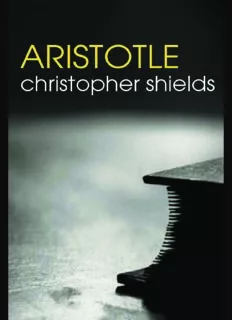Table Of ContentAristotle
‘An impressive and first-rate overview of Aristotle’s philosophy.
I can’t think of a better introduction.’
Richard Kraut, Northwestern University, USA
‘Christopher Shields’ book introduces the philosophy of
Aristotle in a comprehensive, informative and perspicuously
argued way that engages with the philosopher’s arguments with
critical surety and acuity.’
Vasilis Politis, Trinity College Dublin
Routledge Philosophers
Edited by Brian Leiter
University of Texas, Austin
Routledge Philosophers is a major series of introductions to the great
Western philosophers. Each book places a major philosopher or thinker
in historical context, explains and assesses their key arguments, and
considers their legacy. Additional features include a chronology of major
dates and events, chapter summaries, annotated suggestions for further
reading and a glossary of technical terms.
An ideal starting point for those new to philosophy, they are also essen-
tial reading for those interested in the subject at any level.
Hobbes A. P. Martinich
Leibniz Nicholas Jolley
Locke E. J. Lowe
Hegel Frederick Beiser
Rousseau Nicholas Dent
Schopenhauer Julian Young
Freud Jonathan Lear
Kant Paul Guyer
Husserl David Woodruff Smith
Darwin Tim Lewens
Rawls Samuel Freeman
Aristotle Christopher Shields
Forthcoming:
Spinoza Michael Della Rocca
Hume Don Garrett
Fichte and Schelling Sebastian Gardner
Merleau-Ponty Taylor Carman
Heidegger John Richardson
Aquinas Christopher Hughes
Wittgenstein Bill Child
Adorno Brian O’Connor
Foucault Béatrice Han-Pile
Kierkegaard Andrew Cross
Christopher Shields
Aristotle
First published 2007
by Routledge
2 Park Square, Milton Park, Abingdon, Oxon OX14 4RN
Simultaneously published in the USA and Canada
by Routledge
270 Madison Ave, New York, NY 10016
Routledge is an imprint of the Taylor & Francis Group, an
informa business
This edition published in the Taylor & Francis e-Library, 2007.
“To purchase your own copy of this or any of Taylor & Francis or Routledge’s
collection of thousands of eBooks please go to www.eBookstore.tandf.co.uk.”
© 2007 Christopher Shields
All rights reserved. No part of this book may be reprinted or
reproduced or utilised in any form or by any electronic,
mechanical, or other means, now known or hereafter
invented, including photocopying and recording, or in any
information storage or retrieval system, without permission in
writing from the publishers.
British Library Cataloguing in Publication Data
A catalogue record for this book is available from the British
Library
Library of Congress Cataloging in Publication Data
Shields, Christopher John.
Aristotle / Christopher Shields.
p. cm. – (Routledge philosophers)
Includes bibliographical references and index.
1. Aristotle. I. Title.
B485.S44 2007
185 – dc22
2006030862
ISBN 0–203–96194–3 Master e-book ISBN
ISBN13: 978-0-415-28331-1 (hbk)
ISBN13: 978-0-415-28332-8 (pbk)
ISBN13: 978-0-203-96194-0 (ebk)
ISBN10: 0-415-28331-0 (hbk)
ISBN10: 0-415-28332-9 (pbk)
ISBN10: 0-203-96194-3 (ebk)
Dedicated with gratitude to
Terence Irwin
Acknowledgements xi
List of Abbreviations xiii
Chronology xv
Introduction 1
One
Aristotle: Life and Works 8
1.1 Aristotle in the Ancient Biographical Tradition 8
1.2 Aristotle’s Character 15
1.3 The Facts of Aristotle’s Life 17
1.4 Reading Aristotle 22
1.5 Aristotle’s Corpus and the Structure of the Aristotelian Sciences 28
1.6 Conclusions 34
Two
Explaining Nature and the Nature of Explanation 36
2.1 Beginning in Wonder 36
2.2 Explaining Explaining 40
2.3 A Puzzle about Change and Generation 49
2.4 Matter and Form I 53
2.5 Matter and Form II 58
2.6 The Efficient Cause 64
2.7 The Final Cause I 68
2.8 The Final Cause II 78
2.9 Relations Among the Causes 90
2.10 Conclusions 94
Three
Thinking 98
3.1 Definition 98
3.2 Essence and Accident 99
3.3 The Structure of Scientific Knowledge 106
3.4 An Overview of Aristotelian Logic 118
3.5 Dialectic 126
3.6 Univocity and Homonymy 133
3.7 Conclusions 143
viii Contents
Four
Aristotle’s Early Ontology 146
4.1 The General Orientation of Aristotle’s Categories 146
4.2 Aristotle’s Work: TheCategories 150
4.3 The Pre-Categories: an Anti-Platonic Conviction 151
4.4 The Theory of Categories: Kinds of Beings 157
4.5 Generating the Categories 159
4.6 The Fundamentality of Substance 172
4.7 A Puzzle about Bi-valence and Modality 181
4.8 Conclusions 192
Five
Puzzles of Nature 196
5.1 Change 196
5.2 The Infinite 203
5.3 Time 206
5.4 Zeno’s Paradoxes of Motion 215
5.5 The Unmoved Mover 220
5.6 Conclusions 229
Six
Substance and the Science of Being qua Being 232
6.1 Aristotle’s Metaphysical Interests 232
6.2 Aristotle’s Work: the Metaphysics 233
6.3 A Puzzle Remaining from the Physics 234
6.4 The Science of Being Qua Being 237
6.5 The Most Basic Principle of All Science 246
6.6 Substance Reconsidered: Form and Actuality 255
6.7 Conclusions 267
Seven
Living Beings 270
7.1 Psychological Applications of Hylomorphism 270
7.2 The Soul: Life is Meant in Many Ways 271
7.3 Against Reductive Materialism and Substance Dualism 278
Contents ix
7.4 The Hylomorphic Analysis of Living Beings 285
7.5 A Problem for Soul–Body Hylomorphism 290
7.6 Perception and Thought 293
7.7 Conclusions 304
Eight
Living Well 306
8.1 The Final Good for Human Beings 306
8.2 The Character of Human Happiness 310
8.3 Happiness and the Human Function 316
8.4 The Virtues of Character 323
8.5 A Puzzle about Akrasia 329
8.6 Friendship 334
8.7 The Final Good for Human Beings Reconsidered 340
8.8 Conclusions 346
Nine
Political Association 350
9.1 The Orientation of Aristotle’s Political Theory 350
9.2 The Emergence and Priority of the Polis 353
9.3 The Best Constitution 363
9.4 An Ugly Aspect of Aristotle’s Political Naturalism? 368
9.5 Conclusions 373
Ten
Rhetoric and the Arts 375
10.1 Aristotle’s Orientation in Rhetoric and the Arts 375
10.2 Rhetoric as a Craft 377
10.3 Poetic Production 381
10.4 Tragedy 385
10.5 Catharsis 386
10.6 Mimêsis 391
10.7 Prescriptive or Descriptive? 393
10.8 Conclusions 396
Description:This is without a doubt the best introduction to Aristotle that I've come across. Shields has succeeded in presenting the thought of Aristotle in the most digestible, clear and highly readable manner, which is a significant achievement considering the breadth of Aristotle's thought that Shields cove

